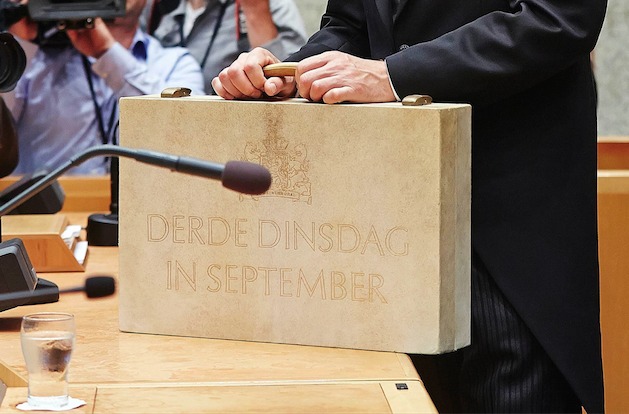Budget main points: ‘It is time to give something back,’ says prime minister


Despite the risks of a trade war and a hard Brexit, it is time to give the people of the Netherlands something back, prime minister Mark Rutte said on Tuesday evening, when asked about the government’s 2019 spending plans.
‘Together we have journeyed through the desert and we’ve had to cough up €51bn,’ the prime minister said, referring to years of austerity to get the government’s books in order following the financial crisis.
‘Now it is only logical to give something back to society, because we did it together,’ Rutte said.
The government’s forecasts predict an average rise in spending power of 1.5% due to tax cuts and other measures, although economists say the figures are largely meaningless.
In addition, tens of thousands of international workers will find their income slashed by hundreds of euros a month because the government will not bring in a transition period to soften the effect of cutting the 30% ruling.
MPs will begin their annual debate on the government’s plans on Wednesday afternoon.
The economy and business
- The economy will grow by 2.5% in 2019
- Unemployment will continue to fall to 3.5%
- The state debt will dip under 50% of GDP
- Brexit could cost the Netherlands 1% to 2% of GDP
- Inflation to rise to 2.6%
- The budget surplus will hit €10bn, but the structural deficit will drop to 0.4%
- 95% of the population will have an average of 1.5% more to spend
- The 15% tax on dividends will be scrapped, costing an estimated €1.9bn
- Corporation tax will be lowered from 25% to 22.24%, rather than 21%, to pay for the dividend tax cut
- Read ING’s take on the ‘mildly expansionary’ budget (in English)
Private taxation
- The difference between the three income tax bands will be narrowed in preparation for the earlier-announced shift to two tax bands by 2021. Income tax in the lowest tax band (€20,142) will be 36.65%, it will be 38.1% up to €68,507 and 51.75% above that
- The reduction in mortgage tax relief will rise from 0.5% to 3% per year from 2020, taking the maximum reduction to 37.05% by 2023
- Home owners who have almost or entirely paid off their mortgage will again have to pay tax on the value of their property. This is being phased in
- The 30% ruling for international workers will be cut from eight to five years with no transition period
- The low rate of value-added tax (btw) which applies to food and entertainment will go up from 6% to 9%, adding €2.83 to a €100 basket of groceries
- The tax rules for having a company bike will be simplified. Users will have to add 7% of the value of their bike to their income for tax purposes.
International affairs and Brexit
- Extra spending to total €8bn, of which €6bn is for public services (see government summary in English)
- €100m to offset the cost of Brexit, including 900 new customs officials, plus €18m for the food and product safety board and €3m for the border police
- €40m more for diplomatic missions in Africa
- Dutch budget for humanitarian aid will rise by €165m to €370m in 2019. Read the foreign ministry’s strategy for 2019 (summary in English)
Crime and security
- Increase in the defence budget of 1.23% a year for five years
- €95m extra to combat cyber crime by the end of this cabinet period
- €291m extra for the police, to provide for 1,100 new officers
- €100m extra to combat crime which is undermining local and provincial government
Other issues:
- Budget will be made available to restore an additional 600 listed buildings
- €80m has been set aside for museums and to encourage ‘artistic talent’
- King Willem-Alexander gets a pay rise of €24,000, queen Maxima and princess Beatrix will also earn more, in line with civil service salaries
- Budget for the royal household (excluding security) to reach €43.3m, a rise of €1m on last year
- €2.4bn more for education, of which most will go to primary education and to improving trade schools
- €50m for culture and language development
- €120m for pig farmers in densely populated areas who wish to stop
- €60m to encourage innovation in intensive farming techniques
- €38m to encourage housing development on old industrial areas
- €100m cut in the special levy on housing corporations to encourage them to build more affordable homes
- Building regulations will be simplified and procedures shortened to boost the supply of affordable rental homes
- €29m to tackle loneliness among the elderly
Thank you for donating to DutchNews.nl.
We could not provide the Dutch News service, and keep it free of charge, without the generous support of our readers. Your donations allow us to report on issues you tell us matter, and provide you with a summary of the most important Dutch news each day.
Make a donation